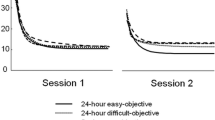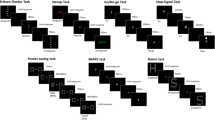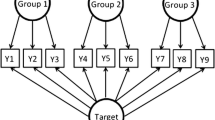Summary
Socratic stimuli, giving a description of a word without presenting the word itself, increase recall as a function of retention interval (see the studies on hypermnesia in Erdelyi, Buschke, & Finkelstein, 1977). In the present study, one lengthy recall task (20 min) or four consecutive recall trials of 5 min followed the presentation of either Socratic descriptions of words or words themselves, which were either of high or low imagery value (Experiment 1). The recall task used the impaired feedback technique (Gardiner, Passmore, Herriot, & Klee, 1977) leaving the already retrieved items unavailable during the remaining time of the recall trial or trials. The nature of the recall task did not affect recall performance, and only Socratic descriptions of high imagery words produced a recall increase. In Experiment 2, two possible sources of hypermnesia with Socratic stimuli were further explored: imagery and the generation effect. Generation failed to produce hypermnesia, while Socratic descriptions of high and low imagery words produced significant effects. Moreover, high imagery words without Socratic descriptions also led to hypermnesia. An encoding context that improves a unique semantic processing is likely to be critical for obtaining hypermnesia.
Similar content being viewed by others
References
Buxton, C. E. (1943). The status of research in reminiscence. Psychological Bulletin, 40, 313–340.
Craik, F. I. M., & Lockhart, R. S. (1972). Levels of processing: A framework for memory research. Journal of Verbal Learning and Verbal Behavior, 11, 671–684.
d'Ydewalle, G., & Haentjens, G. (1986). Ebbinghaus (1885) revisited: A recall increase as a function of test trials. In F. Klix & H. Hagendorf (Eds.), Human memory and cognitive capabilities: Mechanisms and performance (pp. 97–108). Amsterdam: Elsevier.
Ebbinghaus, H. (1885). Über das Gedächtnis. Leipzig: Duncker & Humblot.
Ebbinghaus, H. (1897). Grundzüge der Psychologie. Leipzig: Veit.
Erdelyi, M. H., Buschke, H., & Finkelstein, S. (1977). Hypermnesia for Socratic stimuli: The growth of recall for an internally generated memory list abstracted from a series of riddles. Memory & Cognition, 5, 283–286.
Erdelyi, M. H., Finkelstein, S., Herrell, N., Miller, B., & Thomas, J. (1976). Coding modality vs. input modality in hypermnesia: Is a rose a rose a rose? Cognition, 4, 311–319.
Gardiner, J. M., Passmore, C., Herriot, P., & Klee, H. (1977). Memory for remembered events: Effects of response mode and response-produced feedback. Journal of Verbal Learning and Verbal Behavior, 16, 45–54.
Graf, P. (1980). Two consequences of generating: Increased inter- and intra-word organization of sentences. Journal of Verbal Learning and Verbal Behavior, 19, 316–327.
Haentjens, G. (1984). Hypermnesie bij Socratische stimuli. Doctoral dissertation, University of Leuven, Leuven.
Janssen, W. H. (1973). Voorstelbaarheidswaarden van 327 zelfstandige naamwoorden (Imagery values of 327 names). Nederlands Tijdschrift voor Psychologie, 28, 465–475.z Kruyskamp, C. (1976). Van Dale's groot woordenboek der Nederlandse taal (Van Dale's dictionary of Dutch language). 's Gravenhage: Martinus Nijhoff.
Lammens, L., & d'Ydewalle, G. (1983). Encoding questions and word retrieval. American Journal of Psychology, 96, 3–15.
Murdock, B. B. (1974). Human memory: Theory and data. Hillsdale, NJ: Erlbaum.
Pellegrino, J. W. (1971). A general measure of organization in free recall for variable unit size and internal sequential consistency. Behavior Research Methods & Instrumentation, 3, 241–246.
Roediger III, H. L., & Thorpe, L. A. (1978). The role of recall time in producing hypermnesia. Memory & Cognition, 6, 296–305.
Siegel, S. (1956). Nonparametric statistics for the behavioral sciences. New York: McGraw-Hill.
Slamecka, N. J., & Graf, P. (1978). The generation effect: Delineation of a phenomenon. Journal of Experimental Psychology: Human Learning and Memory, 4, 592–604.
Author information
Authors and Affiliations
Rights and permissions
About this article
Cite this article
Haentjens, G., d'Ydewalle, G. Why do Socratic stimuli produce hypermnesia?. Psychol. Res 49, 169–172 (1987). https://doi.org/10.1007/BF00308683
Received:
Issue Date:
DOI: https://doi.org/10.1007/BF00308683




